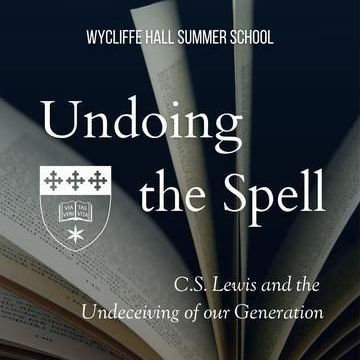Last Sermon at St. Martin's (for now)
On May 14th, 2023, I preached my last sermon in traditional worship at St. Martin's. It was on First Peter 3, as it appears in the Lectionary.
When I was a high school teacher, the deputy head teacher once said to me that when it comes to teaching you have to imagine that you have three buttons on your arm. Teenagers, she told me, have an innate ability to find those buttons and press them. As a teacher, I needed to be aware of their presence and when they were pressed so as not to lose control. Because sometimes when a student pushes back, acts out and rebels, they can really get under your skin!
And her advice proved wise. It’s easy to be loving and gentle and kind in a vacuum. Or when things are going well. But when people are involved—and those people press our buttons—we can find the tank runs dry. We get irritated or impatient. Or full of emotion and drama. We react.
The famous Christian writer, Brennan Manning, said this of our humanity:
“When I get honest, I admit I am a bundle of paradoxes. I believe and I doubt, I hope and get discouraged, I love and I hate, I feel bad about feeling good, I feel guilty about not feeling guilty. I am trusting and suspicious. I am honest and I still play games. Aristotle said I am a rational animal; I say I am an angel with an incredible capacity for beer.”
We have buttons. We are paradoxes. And yet as bearers of the gospel, the body of Christ in the world, we called to lives lives that love. Not just love for those we naturally love: our friends and family. But love those who are difficult to love. Those who test our patience. Those who push our buttons and wind us up. Those who set themselves against us. We are called to love others, sacrificially, turning the other cheek, laying down our egos, our self-righteousness and our preferences, as we follow Christ and do as he calls us to do.
Most of the time, First Peter tells us, that’s going to be a good thing for those around us. Most of the time, that will bring about reward. Who will harm us if we are eager to do what is good?
But what if, as we pursue the good, the holy and the courageous—what if we get resistance? Push back? Dishonor? Reproach? What are we to do when pursuing the good gets us into trouble? When it results in gossip and people assuming the worst about us—even from those we love and respect? What are we to do when we risk facing bullying or even abuse?
If our love is rooted in ourselves and our own natural resources, that is the moment that we might find all three buttons pressed on our arms. Where we lash out and attack. Or where we recoil and withdraw and put up walls. Or where we cry out in indignation and lament how we have been wronged.
Underlying our natural responses—whether they are fight or flight, silence or violence—is a common cause. A very human motivation. Fear.
And how crippling fear can be.
So often, we fear others. The harm they may be able to do us, physically or materially. We might fear bodily harm or injury. Or perhaps we fear those who could financially ruin us. But it might also be about the security of relationships. Someone might leave us. They might tell stories about who we are and slander or misrepresent us.
Perhaps it runs even deeper: maybe we fear others because if any of those things actually happen—maybe THIS will be nail in the coffin that proves to us that we are as woeful, weak, shameful and undeserving as we secretly believe that we are.
Yet First Peter says this about doing good that might bring about harm or abuse: "Do not fear what they fear and do not be intimidated, but in your hearts sanctify Christ as Lord." (v.14-15)
This verse draws from Isaiah chapter 8 in which the people of God are told, when full of fear at the threat of a foreign power. Isaiah says:
Do not fear what they fear,
and do not dread it.
The Lord Almighty is the one you are to regard as holy,
he is the one you are to fear,
he is the one you are to dread.
Do not fear what others fear. Sanctify Christ. Fear Christ.
Our natural human reaction is to resort to one kind of defense or another. Some form of self-protection and validation that will keep us safe from harm. But First Peter tells us that as Christians, we are to switch out our fears. Trade them in.
To the Cross we bring our fears of others, fear of rejection, hatred, physical harm, death, alienation, shame, humiliation—you name it—and lay them at his feet. These fears are not ours anymore.
In their place, we are to fear just one thing: one being: God as revealed in Jesus Christ.
And of course, the fears we are trading in are not quite like the fear we take on in return. For in Christ we have a God who has made a way for us to draw near. A God who has deigned to help reconcile us back to Him when there was nothing we could do to free us from our chains. He knows our secrets and acted anyway. In Christ we have a God who accepts us even knowing the fulness of our mistakes and our shortcomings. Where we are broken and weak-kneed. Where we have failed. Where we lived half-lives and had hardened hearts. Where we have chased after idols.
Fear of others or fear of God in Christ?
Another way to imagine it might be to ask ourselves the question: if my life is a stage, who is my audience? My spouse? My boss? My neighbors? My parents? My colleagues? My friends? Am I playing for their laughs? Their approval? Their support? Their positive reviews?
Or is my audience God himself and God alone? The difference being that with God as my audience, I have his Spirit with me, who shares the stage and shows me where to go and how to live? All I am to do is submit and listen and respond?
Fear of others or fear of God?
"Do not be intimidated, but in your hearts sanctify Christ as Lord." (v.14-15)
In your heart let there be only one audience. The audience of God in Christ. Follow him and him alone.
Fear of God is about faith.
It takes faith not to engage when others want a fight or are pushing for a reaction.
It takes faith to remain tender-hearted and forgiving when others slander us for pursuing God’s will for our life.
It takes faith to humbly respond, when asked, about what we believe and why—and so share our hope.
And it takes faith to "maintain a good conscience." (v.16) To keep doing the right thing, even when pressed.
Without effort, our conscience remains dulled. When we run from ourselves and hide behind denial and convenience—when we are driven by many fears rather than one—that little voice of conscience goes dormant. Like muscle wastage when you’ve been sick a while, our conscience can all but disappear.
But as with regular exercise through which our physical strength can be regained and our fitness rebuilt, so with regular spiritual exercise our conscience can re-emerge and be sharpened once more. Where we discover integrity of actions: where our outside match our insides, where we are no longer living divided and shame-filled lives. Where we dare to start doing right by God.
Maintain a good conscience: be in the habit of listening for God’s voice, the quiet nudge, the uncomfortable thought—and do that. Obey. Follow. Take a risk. Make space to listen. Don’t confuse (as many do) conscience for adrenaline. Conscience is not about the surge of energy that comes when we feel indignant or reactive. Conscience finds its voice in still and deep waters, not turbulent waves that crash down violently upon jagged rocks. Conscience speaks with quiet conviction about the right action we should be taking, it does not fixate on that of others.
Work to maintain a good conscience. So that when the moment of truth comes, we might find the strength that Martin Luther had so much of during the Reformation. When he was pressed by religious officials to recant from his outspoken criticisms of the Roman Catholic church, he’s famously reported as having responded:
"My conscience is captive to the Word of God. Thus I cannot and will not recant, because acting against one’s conscience is neither safe nor sound. Here I stand; I can do no other. God help me."
"It is better to suffer for doing good, if suffering should be within God’s will, than to suffer for doing evil." (v.17)
We bear little risk of persecution or physical death in following God. But we can face slander, derision and social rejection. From family, from friends, even those who believe! When we seek to do good, love humbly and forgive generously. When we step out in faith and follow.
It is better, First Peter tells us, to bear this dishonor faithfully and keep on keeping on regardless. To not lose sight of our goal and keep doing the good He has called us to do. Listening and following the voice of conscience. For while we may bear embarrassment or rejection for acting with integrity, much better we experience that shame now, than the being confronted with shame of shunning God’s voice when He comes to judge the world.
Yes, some days, it seems like, for a moment, that injustice is winning and darkness abounds. Evil may win a battle here or there, but it has already, irrevocably, lost the war. Christ is on the throne. All powers are at his feet. There is nothing but Him to fear.
So do good.
Fear God.
Maintain a good conscience.
And await the day of Christ. Amen.



